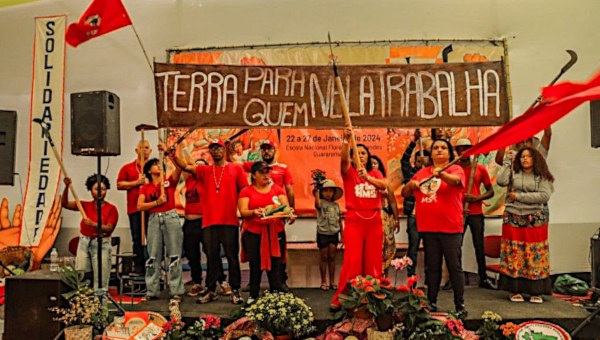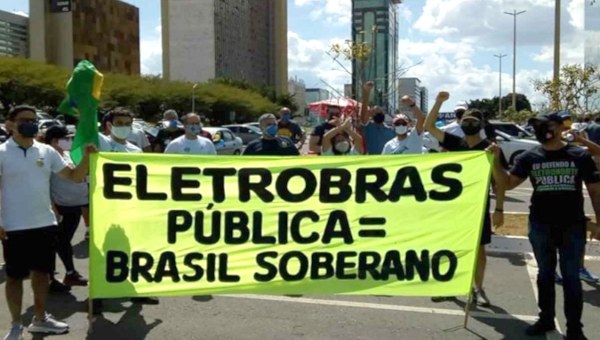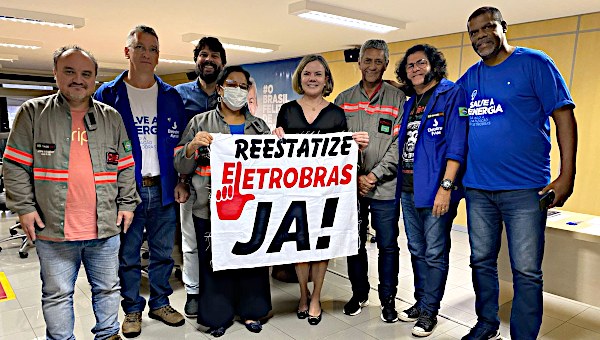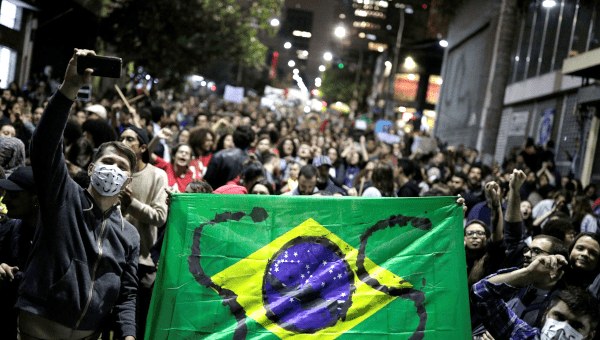Greenwashing with Bolsonaro: Heineken and Carrefour privatize the Amazon
The history of alliances between big capital and fascism has many different chapters and they continue to be written, but there has rarely been an uglier or more despicable example than the current cooperation between the transnational companies Heineken and Carrefour with the Jair Bolsonaro administration in Brazil.
What is happening? In another move to be rid of the responsibility for the protection of the Brazilian part of the Amazon rainforest, which makes up 60 per cent of the total of Amazonia, the Brazilian Minister of the Environment, Ricardo Salles, offered up 132 natural conservation areas in Brazil in early February 2021 for ‘adoption’ by private companies which would then, supposedly, fund environmental services in these areas.
The project runs under the label “Adopt a Park” and comprises not only a new form of greenwashing for the companies involved, but will probably also serve as a way for these companies to increase their pollution, since they can reclaim these areas as carbon credits. Bolsonaro made remarks at the Global Climate Summit on 22-23 April implying that Brazil aims to use its forests as carbon credits.
Apart from these questionable manoeuvres other issues are involved. Privatization initiatives rarely keep the promises made by their advocates, as can be seen with the privatization of energy markets in Brazil. Coming with high energy prices for private consumers and the terrible quality of network maintenance, it is quite likely that the privatization of conservation areas will lead to environmental degradation and interference in the lives of the communities who live in the proposed ‘adopted’ areas. The program also serves as a cover for the fact that the Bolsonaro government eliminated all kinds of programs for environmental protection, though funds necessary for such protection exist.
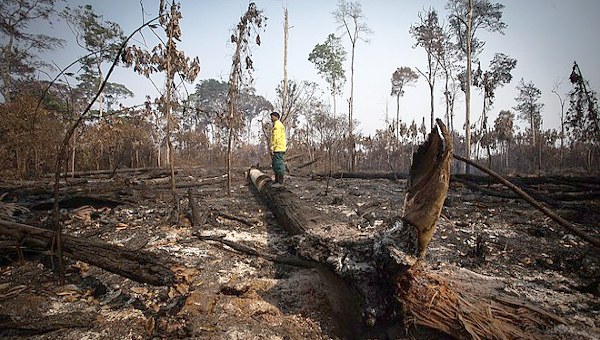
Privatization Against Popular Struggles
The most nefarious aspect of the proposed program is that almost half of the 132 conservation units offered for ‘adoption’ in its first phase are natural reserves that are the result of popular struggles by the populations living in those areas in an ecologically sustainable form. Up till now, eight conservation units have been adopted, two of them by Heineken and Carrefour. The two in question have for years been legally designated as extractive reserves (reserva extrativista – RESEX) that are administered jointly by the federal state and the populations who live in those areas.
The Amazon is not a product of nature, but rather, a product of the millennial exchange between human populations and the natural environment. From the beginning of the colonial invasion of Brazil, some of the natural areas in the Amazon were cleared for agriculture, cities, or mining projects. A considerable part of the populations that came to Brazil from Africa, Europe, and Asia joined the Amerindian populations in their traditional way of life, living from the bounty of the forest and water areas, without tearing down the forest, enabling the resident populations even today to sell some of the forest products to local markets without entering into relations of workforce exploitation. More importantly, the access to natural territories facilitates not only access to food, and thus provides some degree of autonomy from the monetized economy, but is also the basis for community life and the social reproduction that takes place in these territories.
One of the latest historical forms of this struggle for the maintenance of collective territories has been incorporated by the National Council of Extractivist Populations (CNS), which includes various traditional communities who live from the collection of fruits and nuts, fishing, and small-scale subsistence agriculture, thus helping keep the natural areas intact. The CNS was founded in 1985 as the National Council of Rubber Tappers by Chico Mendes and his comrades. Mendes received the UN Global 500 Prize in 1987 for his environmental engagement. He was assassinated in December 1988 by gunmen sent by large landowners with whom he had entered into conflict.
Chico Mendes’s idea to create protected areas for traditional communities, who number around 12 million people in Brazil, bore fruit, and today there exist 94 of the extractive reserves (RESEX), and 32 Sustainable Development Reserves (RDS). The RESEX comprise an area of 15.5 million hectares of which 15 million are in the Amazon region, while the RDS add another 8.6 million protected hectares. Under all these models, traditional communities are granted the right to use these territories but they remain in the legal possession of either the federal state, or in the hands of other levels of the Brazilian state. The RESEXs come with a concession granted to the organizations representing traditional communities to use these areas and are administered by the environmental organs of the state. While this common administration is not without flaws and conflicts, the creation of the RESEX has resulted in a much-increased level of protection of these territories, in which large commercial activities are banned by law. Approximately 600,000 persons live in RESEX and RDS areas.1
Corporations Target Traditional Communities
The two territories ‘adopted’ by Heineken and Carrefour are RESEX, and the populations who live in these reserves and co-administer them were not only not asked if they wanted to be ‘adopted’, they were also not informed when the ‘adoption’ happened! Of the 132 conservation units offered for adoption by the Ministry of Environment, 50 are RESEX, which signals that the current government aims to abolish the self-determination of those communities, which exist as a result of decades of struggle.
In the case of Heineken, it ‘adopted’ the RESEX Quilombo do Frechal (9,300 hectares) in the northern state of Maranhão. The population in this RESEX descends from enslaved workers who fled slavery and founded their own settlements, called Quilombos. As for Carrefour, it adopted the RESEX do Lago do Cuniá (75,800 hectares) in the state of Rondônia. This procedure does not only violate the International Labour Organization’s Convention 169, ratified by Brazil, that regulates the rights of indigenous and traditional communities to be consulted in case of government plans concerning their territories, but also, various national laws that regulate these and other conservation areas. The program “Adopt a Park” even includes indigenous territories, which violates Article 231 of the Brazilian constitution of 1988. If this project by Salles and Bolsonaro goes through, it will set a dangerous precedent. The CNS has launched a public investigation into the issue via the state of Amazonas, as was reported by the newspaper Estado de São Paulo on 13 April 2021.
Why do Heineken and Carrefour engage in Brazilian environmental politics as transnational corporations? Both companies hold important markets in Brazil. Heineken accounts for 20 per cent of the Brazilian beer market, with its own signature brand as well as with local brands such as Devassa, Glacial, Kaiser, Eisenbahn, and Schin that Heineken bought from a competitor in 2017. With this portfolio, Heineken is the second largest brewer in Brazil, while the Brazilian market is the most lucrative one for the global company.
Carrefour has already been the second largest retail chain in Brazil for a few years, and with the acquisition of the chain Grupo Big in March 2021, it became the largest retailer in Brazil, both with its flagship brand Carrefour and the low-budget supermarket Acatadão, as well as with a number of smaller brands of corner shops. With the new acquisition, the customer base of Carrefour in Brazil is estimated to have increased from 45 to 60 million customers.
“Adopt a Park” was officially launched on 9 February 2021 by the Brazilian Ministry of Environment in the presence of its head, Ricardo Salles, as well as Brazilian president Jair Bolsonaro and the Latin American president of Carrefour, Noel Prioux. The Brazilian government plans to include all 334 federal units of conservation into the program, but the first phase offers 132 units in the Amazon basin for ‘adoption’. The initial price of investment is R$50 (reals) per hectare or €10 for foreign companies. The Brazilian government expects to collect R$32-billion per year for the program.
Wanton Environmental Destruction
The logic of the program follows a similar one presented by Bolsonaro at the Global Climate Summit on 22-23 April 2021. While all mechanisms of environmental protection in Brazil are experiencing their lowest funding in years, several institutions are being dismantled, and illegal loggers and miners are being encouraged to expand their activities. Some greenwashing mechanisms that include payment by other parties are designed to accompany this path of destruction.
For example, the program Protected Areas of Amazonia (ARPA), which was founded in 2002 with international financial support, has been discontinued by the Bolsonaro government, although it was allocated funding of $215-million (US) which is not currently being used. Similarly, the Amazonia Fund, which was supported mainly by Germany and Norway before they stopped funding it in 2019, still holds about $600 (US), which also remains unspent since Bolsonaro started his presidency.
In the wake of the recent Global Climate Summit, Environment Minister Salles accused the governments of Germany and Norway of having stopped access to money in this fund. The Norwegian embassy quickly responded, alleging that the Brazilian government dismantled the governance structure of the fund unilaterally in June 2019. Thus, it is not a lack of funds that prevents the Brazilian government from promoting environmental protection, but rather, the lack of political motivation.
At the same time, Minister Salles is being investigated by the Federal Police for his obstruction of one of the largest operations against illegal loggers that took place in December 2020, during which the Federal Police retrieved an enormous amount of timber in the state of Pará. The police official responsible for the investigation, a former friend of Bolsonaro, was sacked after the investigation started in April 2021. Meanwhile, at the Supreme Court, the Bolsonaro government is facing an investigation due to the non-application of the monies attached to the Amazonia fund.
The reactions by environmentalists to “Adopt a Park” were harsh. The well-established organization Observatório do Clima (Climate Observatory) commented acerbically, ‘Adopt an Ecocide’,2 and around 50 grassroots organizations and NGOs signed a letter criticising the program, among them the CNS, the National Coordination of Articulation of Black Rural Quilombola Communities (CONAQ), the Landless Workers Movement (MST), Brazil’s largest trade union federation CUT, the Catholic rural organization Commissâo Pastoral da Terra, and the organization Carta de Belém, which was founded in the wake of the World Social Forum in Belém in 2006.3
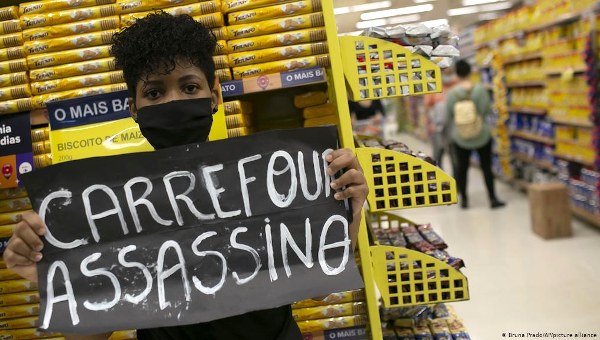
Corporate Malfeasance in the Time of Covid
The obvious question is why Carrefour and Heinken are willing to operate in such a manner, involving not only the violation of the rights of several populations, and the violation of numerous laws, but also, a completely inefficient form of environmental protection.
Carrefour has seen a series of incidents in which its direct employees and security forces used excessive violence in Brazil. In 2009, a shoplifter was tortured and killed by a shop manager and security, and in 2013, a black customer was mistaken for a thief and tortured by security guards. More recently, on 19 November 2020, João Alberto Silveira Freitas, a black male customer, was killed after a verbal exchange with two security guards, while a supermarket employee tried to prevent bystanders from filming the incident. This last assassination occurred one day ahead of the Day of Black Consciousness in Brazil and led to various demonstrations in front of Carrefour shops. Responding to the murder of Freitas, on April 30, Carrefour started a massive campaign against racism with television clips at prime time and a bundle of concrete measures. Yet, the participation in the “Adopt a Park” program shows that Carrefour´s understanding of social responsibility and racism remains extremely limited.
It will be interesting to see how the corporate social responsibility and sustainability departments of these companies will try to sell this form of engagement, which blatantly violates the rights of the populations that often have lived for decades or even centuries in these areas. Most likely the ‘highflyers’ in Heineken and Carrefour bet that the pandemic is a great opportunity to get involved in a shiny, good looking project of environmental and social engagement. But they might be wrong, and Carrefour, in particular, seems keen to add another scandal to its already dismal track record. That these deals to privatize conservation areas were concluded at a time when Brazil was hitting one of the worst moments of the Covid-19 pandemic speaks volumes about the lack of a minimal sensibility and a sense of honour on the side of these corporate leaders.
Interestingly, a recent report in the Financial Times pointed out that the “Adopt a Park” program would not be of interest to most investors, due to its lack of environmental credibility. •
Endnotes
- Mary Allegretti. “30 Anos do Legado de Chico Mendes,” Desenvolvimento e Meio Ambiente, (ufpr.br).
- “‘Adote um Ecocida’: novo programa ambiental do Governo Federal é alvo de críticas,” Sou Ecológico.
- “Saldão do governo Bolsonaro sobre as unidades de conservação! Organizações e Movimentos Sociais se mobilizam contra o programa ‘Adote um Parque’,” Grupo Carta de Belém.


